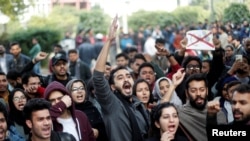The Office of the U.N.’s top human rights official is urging India to scrap its new Citizenship (Amendment) Act, which it says discriminates against Muslims.
Violent protests erupted in the Indian states of Assam and Tripura in the wake of last week’s passage of India’s new citizenship law, killing three people and Injuring many others, including police officers.
The U.N. human rights office says it deplores the government’s brutal crackdown on those protesting the enactment of the law, which it calls fundamentally discriminatory. The amended legislation grants citizenship rights to six religious minorities fleeing persecution in Afghanistan, Bangladesh and Pakistan.
But human rights spokesman, Jeremy Laurence, says the law does not extend the same protection to Muslims.
“The amended law would appear to undermine the commitment to equality before the law enshrined in India’s constitution and India’s obligations under the International Covenant on Civil and Political Rights and the Convention for the elimination of Racial Discrimination, to which India is a state party,” he said.
Laurence says India’s Citizenship Act could violate these international covenants, which prohibit racial, ethnic or religious discrimination.
“Although India’s broader naturalization laws remain in place, these amendments will have a discriminatory effect on people’s access to nationality. All migrants, regardless of their migration status, are entitled to respect, protection and fulfillment of their human rights,” he said.
A Muslim political party along with lawyers and rights groups have challenged the law in India's Supreme Court, arguing that it violates the country's secular constitution. The U.N. human rights office says it hopes the justices will consider whether the law is compatible with India’s international human rights obligations.










